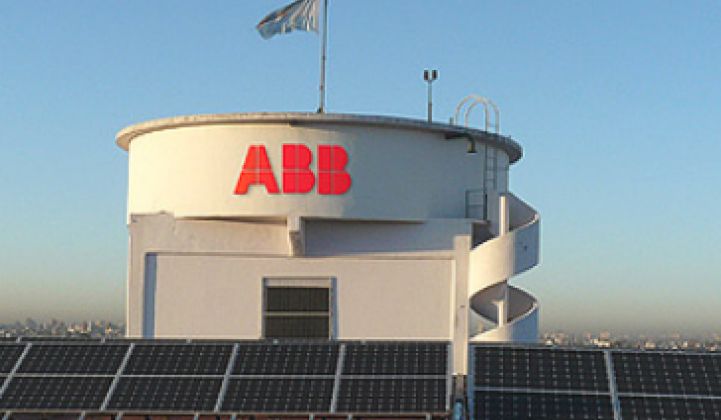ABB announced an $80 million order earlier this week to develop a 100-megawatt photovoltaic solar project for the Grand Renewable Energy Park in Ontario. It will be Canada’s largest solar photovoltaic plant.
ABB will provide a balance-of-system solution as well as the engineering, electrical installation and performance testing of the plant. The project is part of a $5 billion investment by Samsung Renewable Energy and its partners to build a green energy cluster of wind and solar power with a capacity of 1,369 megawatts.
Although ABB’s solar team is currently on a North American tour touting its utility-scale projects, the global power automation giant has a solar vision that will be deployed in smart buildings and microgrids. It is part of ABB’s larger strategy to reposition its power systems division toward systems, services and software rather than engineering, procurement and construction.
“Going forward, solar will be part of a comprehensive solution to address different applications that are emerging,” said Maxine Ghavi, global head of ABB’s Solar business.
Two of the key applications that ABB sees are at the edge of the grid: hybrid microgrids, which blend renewables with a diesel generator, and smart buildings.
ABB has capabilities across the ecosystem of power electronics, from grid components to electric vehicle chargers. But it was lacking in the solar business until recently. Earlier this year, ABB acquired PV inverter company Power-One for $1 billion. Previously, ABB had a position in the inverter market, but only for utility-scale applications, and no presence in North America.
“Inverters have the potential to bridge the solar and smart grid worlds, making this a more than reasonable fit for ABB,” Eric Wesoff wrote at the time of the acquisition.
Ghavi spoke about the drive to bring together ABB’s power electronics, software and distribution automation expertise to deliver turnkey solar solutions to various markets.
Inverters in particular, will require “constant innovation” to meet the requirements of different regional markets and grid needs, said Ghavi. “There’s also a sense of wanting to differentiate above and beyond what everyone else offers,” she added.
In the area of smart homes and buildings, ABB sees an opportunity to bring together solar power with building automation systems, energy storage, and electric vehicle charging, as well as to integrate with the distribution grid so that the buildings can be an asset to the grid, such as for more dynamic demand response.
Despite ABB’s recent win in Canada, the company is looking beyond utility-scale projects to integrated grid and renewable solutions. “Is the solar going to grow in the middle of the desert or on your roof?” asked Bob Stojanovic, head of solar in North America for ABB. “I would say it’s going to the roof.”
The convergence of distributed solar, smart grid and energy storage is exactly where ABB expects to be playing in coming years. “This is [what] I get most excited about,” said Ghavi. “We can now offer the most comprehensive value proposition in the PV industry.”



